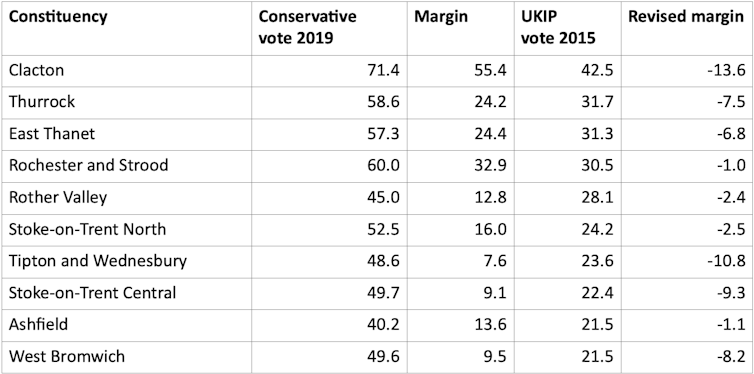With Nigel Farage’s surprise return to frontline politics and Reform surging in the polls, there is increasingly fevered speculation as to how much damage Reform will do to the Conservatives in the election, and whether they will even overtake the Tories in terms of vote share.
The polls don’t look reassuring for Rishi Sunak, with some suggesting that as many as one in three voters who backed the Conservatives in 2019 now back Reform. But at the same time there is still a lot of uncertainty, and any predictions come with health warnings.
We’ve looked at what would happen to the Conservatives if Reform replicates the performance of Ukip from 2015, when the party secured nearly 4 million votes – 12.6% of the national total.
The 2015 election is significant because it marked the start of a journey that shaped both Ukip (and its successor parties) and the Conservatives.
In the aftermath of Brexit, the Conservatives targeted former Ukip voters, first under Theresa May and then Boris Johnson. This strategy worked in terms of cannibalising Ukip support but came at a cost. More liberal, pro-European Conservative supporters started to move away from the party.
But the Conservatives’ Brexit coalition is now crumbling and voters on the right of the party’s support base are also now a flight risk. The question is how many voters who switched from the Conservatives to Ukip in the past will once again return to Farage in 2024.
Reform is currently hovering at about 16% in the poll of polls, which more than what Ukip was on in the run up to the 2015 general election. That year therefore represents an instructive point of reference to benchmark the potential impact of Reform’s surge in the polls on Conservative held seats.
However, it is not straightforward to simply map Ukip’s past electoral performance on to current electoral boundaries. Part of the problem is that new constituency boundaries come into force this election, making it difficult to use past results to make future projections. Our approach has been to draw on a major new data collection exercise that we have undertaken. This redistricts past election results since 1997 onto the new constituency boundaries, using population counts for 189,000 census output areas. This data provides an insight into how residents in the current constituencies have voted over time, and crucially how they voted in the 2015 election.
We’ve identified ten seats, all of which are in England, where Reform could inflict the most damage on the Conservatives if they replicate Ukip’s 2015 showing.
They include Clacton, where Nigel Farage will be hoping to emulate Douglas Carswell’s showing for Ukip in 2015. Despite a whopping Conservative majority last time out, a repeat performance at the Conservatives expense would put Farage and Reform in first place.
Another to watch is Thurrock in Essex, where the Conservatives won by a majority of 11,482 over Labour in 2019. Now, the margin of their victory would be overturned if Reform did as well as Ukip did in 2015 at the Conservatives’ expense.
Other areas of interest include two Stoke-on-Trent constituencies and Northampton North.
All would see sizeable Conservative majorities overturned. And, in the case of Clacton and Rochester and Strood, would see Reform victories.

A threat in 68 constituencies
In the 2019 election, the Brexit party fielded just 277 candidates and did not contest in seats where there was an incumbent Conservative MP. In contrast, for this election, Reform is fielding 609 candidates. And so, if Reform is to match UKIP’s 2015 vote share; the swing will be even greater in Conservative-held seats than in ones held by Labour.

Our results indicate that in 68 constituencies, the Conservative majority would be overturned if Reform matches Ukip’s share of the vote in 2015.
This means, that all else being equal, if Nigel Farage is able to galvanise former Ukip voters away from the Tories, then the prospect of a bad election for Rishi Sunak could get even worse. Of course, not all else is equal – and with Labour far ahead in the polls there may be numerous other seats where Reform could act as a spoiler by denying the Tories a victory. Or, indeed, Labour may be so far ahead in some places that Reform’s vote will not affect the outcome. But neither scenario is likely to provide the Conservatives with much comfort.
This article is based on research carried out with Paula Aucott and Chris Prosser.
Humphrey Southall is a member of the Labour Party.
This article was originally published on The Conversation. Read the original article.







